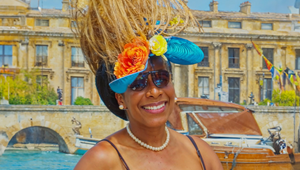
Planning for the Best: "Above All Be Useful"

As VP of strategy at McCann Montreal, Badr oversees strategic planning across key clients including Nespresso, L’Oréal, General Motors, Export Development Canada, Skip the Dishes and the Royal Canadian Mint. In addition to leading strategy for clients, he also sits on McCann’s Canada-wide strategic planning council and contributes to McCann’s Truth Central global intelligence unit. Badr joined McCann in 2020 from VICE Media, where he oversaw strategic alliances, joint ventures and partnerships. Prior to his role at VICE, he played senior strategic planning roles at Bleu Blanc Rouge, Cossette and Bob, leading strategy for clients including McDonald’s, Aeroplan, BDC, Unilever and Desjardins.
LBB> What do you think is the difference between a strategist and a planner? Is there one?
Badr> Following the simple rule that the meaning of a word is in its usage, there is clearly a difference between a planner and a strategist. A planner tends to focus on upstream brand and marketing issues that have a longer-term impact on a client’s business, tracking high-level brand metrics and setting the strategic direction for the next 18 to 24 months. Meanwhile a strategist works with a shorter time horizon, focusing on campaign relevance, immediate cultural impact, channel specific insights, trends and performance.
LBB> And which description do you think suits the way you work best?
Badr> I am definitely more of a brand planner, based on the way I tend to approach problems and challenges. But you have to be able to orchestrate the solution and collaborate across disciplines and timeframes, so I’d say that I’m a planner that loves to play with strategists.
LBB> We’re used to hearing about the best creative advertising campaigns, but what’s your favourite historic campaign from a strategic perspective? One that you feel demonstrates great strategy.
Badr> I think that the classic “I’m a MAC and I’m a PC” campaign is one of the most brilliant strategic chess moves in the industry’s ‘recent’ history. Many great campaigns effectively position their own brand in the mind of consumers, but few manage to do it while astutely positioning their competitors at the same time.
LBB> When you’re turning a business brief into something that can inform an inspiring creative campaign, what do you find the most useful resource to draw on?
Badr> Storytelling approaches in visual arts or film that have solved similar problems are always inspiring. Take the scene from the movie “The Big Short” where Anthony Bourdain explained CDOs (collateralized debt obligations) by drawing an analogy to a seafood stew recipe – that’s an excellent starting point for simplifying a complex FI brief.
LBB> What part of the strategic process do you enjoy the most?
Badr> Discovery and framing – both with clients and creative. Both phases are extremely enjoyable, collaborative and complementary. With clients you’re helping sharpen the problem and with creatives you’re crafting the solution.
LBB> What strategic maxims, frameworks or principles do you find yourself going back to over and over again? Why are they so useful?
Badr> 'Above all be useful' – that should be the maxim of our discipline. It helps us keep in mind that we are a practical art meant to solve critical business issues, not a theoretical science – no matter the amount of data at our disposal.
Different frameworks come in handy in different contexts, so it’s good to be well-versed in a wide variety of tools and yet be judicious in the choice of which one to apply. I don’t necessarily have a favourite framework, but more of a portfolio / tool kit of models that I’ve built over time.
LBB> What sort of creatives do you like to work with? As a strategist, what do you want them to do with the information you give them?
Badr> In my experience, creatives are very roughly either Platonist or Aristotelians. Platonists tend to come from a strong design background, they love to approach a problem systematically and architect a perfectly integrated solution. Aristotelians start from the ground up: they’re in the cave, they muddle through imperfection, brainstorms, concepts and keep iterating. I enjoy working with both types. But be advised: each type processes strategic insights quite differently, so don’t confuse one for the other or you’re in trouble.
LBB> There’s a negative stereotype about strategy being used to validate creative ideas, rather than as a resource to inform them and make sure they’re effective. How do you make sure the agency gets this the right way round?
Badr> I think that’s a false dichotomy that looks at the problem from a linear perspective. Some creative ideas inherently solve a business problem and should then be validated, while others need strategy as a prime mover to bring them to life.
LBB> What have you found to be the most important consideration in recruiting and nurturing strategic talent? And how has Covid changed the way you think about this?
Badr> The origins of the strategy discipline are in the classic tutorial system rooted in a lively dialogue – which is to say that, at the heart of a good strategic team, is the ability to have enjoyable and fruitful debates. What that means from a recruitment perspective, is that you want to broaden the conversation by bringing diversity of perspective, talent and background to the table – staying true to the authentic dialogue while making sure everyone can fully participate.
The silver lining of Covid is that it has helped us accelerate integration and collaboration irrespective of geography – so we can recruit even more broadly.
LBB> In recent years it seems like effectiveness awards have grown in prestige and agencies have paid more attention to them. How do you think this has impacted on how strategists work and the way they are perceived?
Badr> The promise of the strategic discipline has always been to drive creative effectiveness. And while it’s definitely important to have prestigious effectiveness awards, I again think it’s a false dichotomy to oppose creativity and effectiveness. They go hand in hand. I think you want to avoid institutionalizing that separation by having creatives care only about Cannes and strategists focus exclusively on Effies.
LBB> Do you have any frustrations with planning/strategy as a discipline?
I think planners and strategists are individually ambitious – but we’re too often isolated and siloed. As a result, we’re not ambitious enough as a discipline.
LBB> What advice would you give to anyone considering a career as a strategist/planner?
First, know thy self – What kind of strategist do you want to be? What kind of team would you like to join? What kind of work do you find meaningful and rewarding? Once you’ve figured that out, you can start mapping your growth. Second, be a ‘learn it all’ and not a ‘know it all’.













